Who made the simple and straightforward Islam complex?

Simple and straightforward religion
Islam is a complete religion or way of life (Surah Al-Ma'idah- 3). This religion was sent not just for personal practice but for establishing it over other worldly systems, i.e., it was sent through the last Messenger Muhammad (pbuh) to be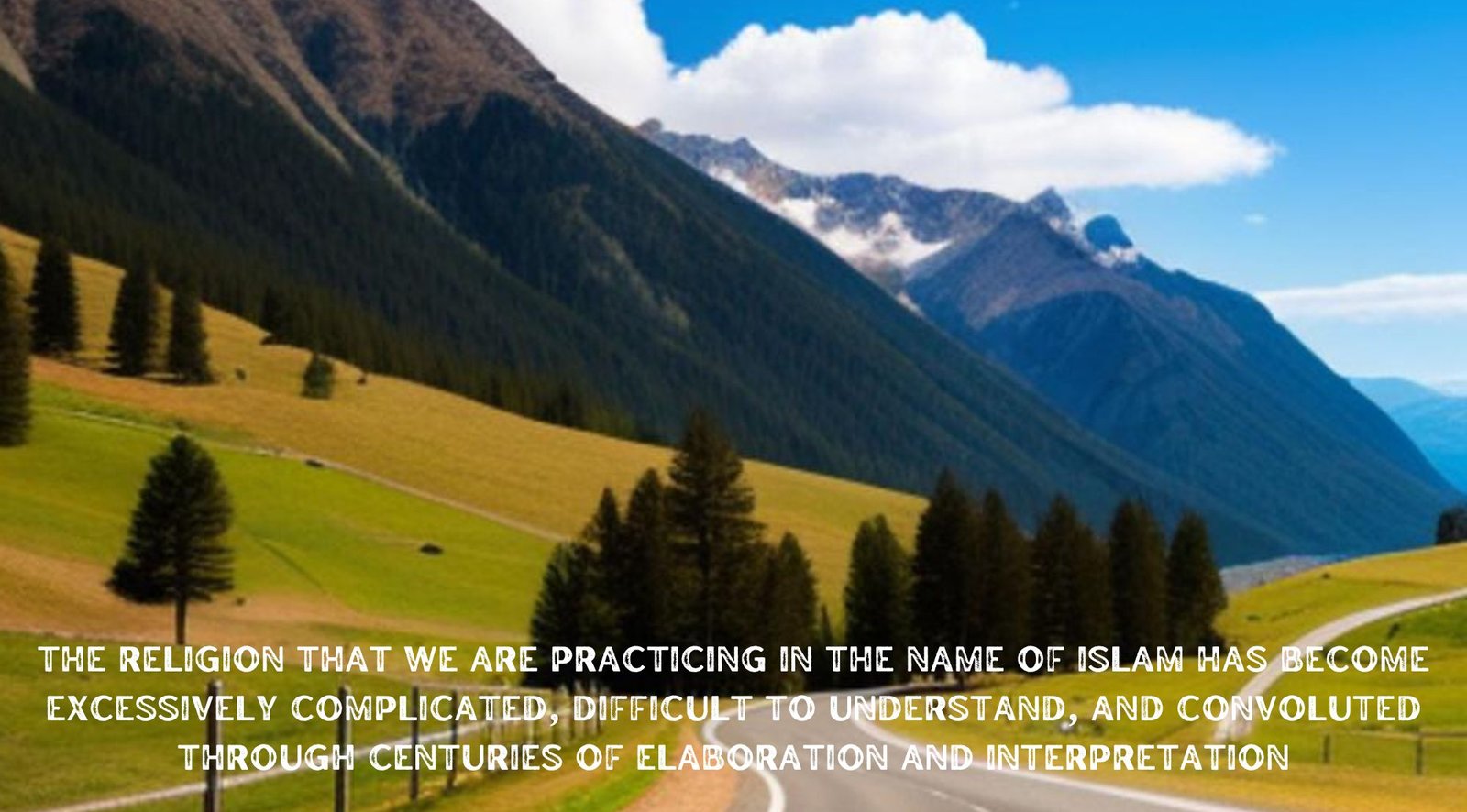 established throughout the world (Surah At-Tawbah- 33, Surah Al-Fath- 28, Surah As-Saff- 9); it was not sent solely for personal practice. It can be understood from common sense that the religion sent for the entire human race, for the whole world, must be extremely simple, because if the religion becomes complex and difficult to understand, then people from different regions, rich-poor, white-black, literate-illiterate, men-women, in short, humanity as a whole, will not be able to practice it appropriately. Therefore, this religion was made extremely easy by the great Allah (Surah Al-Fath- 5). By saying "easy religion," it means that understanding this religion will be easy and it will also be easy to practice it. He said, "O believers, when you rise for prayer, wash your faces, and your hands up to the elbows, and lightly rub your heads and wash your feet up to the ankles. If you are in a state of impurity, then purify yourselves; but if you are ill or on a journey, or one of you comes from the privy, or you have been in contact with women and cannot find water, then seek clean earth and wipe over your faces and hands with it. Allah does not want to place you in difficulty, but He wants to purify you, and to complete His favour upon you, so that you may be grateful." (Surah Al-Ma'idah- 6). So that no one faces any difficulty in accepting any matter of this religion, Allah made it so easy that He said, He does not want to put us in trouble.
established throughout the world (Surah At-Tawbah- 33, Surah Al-Fath- 28, Surah As-Saff- 9); it was not sent solely for personal practice. It can be understood from common sense that the religion sent for the entire human race, for the whole world, must be extremely simple, because if the religion becomes complex and difficult to understand, then people from different regions, rich-poor, white-black, literate-illiterate, men-women, in short, humanity as a whole, will not be able to practice it appropriately. Therefore, this religion was made extremely easy by the great Allah (Surah Al-Fath- 5). By saying "easy religion," it means that understanding this religion will be easy and it will also be easy to practice it. He said, "O believers, when you rise for prayer, wash your faces, and your hands up to the elbows, and lightly rub your heads and wash your feet up to the ankles. If you are in a state of impurity, then purify yourselves; but if you are ill or on a journey, or one of you comes from the privy, or you have been in contact with women and cannot find water, then seek clean earth and wipe over your faces and hands with it. Allah does not want to place you in difficulty, but He wants to purify you, and to complete His favour upon you, so that you may be grateful." (Surah Al-Ma'idah- 6). So that no one faces any difficulty in accepting any matter of this religion, Allah made it so easy that He said, He does not want to put us in trouble.

Now, let's examine this hadith. Narrated 'Aisha (ra): Allah's Messenger (pbuh) was given the choice between two things, and he used to opt for the easier one as long as it was not sinful; but if it was sinful, he would remain far from it. (Sahih Bukhari, Book of Merits of the Companions, Chapter 74, Hadith 385; Sahih Muslim, Book of Virtues, Chapter 7, Hadith 80). Why did he choose the easier one? Because the ummah would follow him. If he chose the easier one, it would be easier for the ummah to follow in the future. Hence, it is clear from this that this religion is extremely easy, there is no opportunity to make it difficult or complex.
The foundation and purpose of the religion are simple and straightforward
When Allah and His Messenger, referred to this religion as simple and straightforward, it needs to be understood how it is made simple and how it is made complex or difficult. From Adam (AS) to the last Messenger (SAW), Allah sent the same religion for mankind, despite variations in place and time, with the same principles. That is monotheism (Tawheed), the belief in one God, one Lord, one Creator (Lawgiver). His commandments, directions, laws supersede all others; any other command, direction, law is not to be followed. This is what Allah calls "Deen-ul-Qayyimah" in the Quran. "And indeed, it is upon Us to guide [the righteous], And indeed, to Us belongs the Hereafter and the first [life]. So I have warned you of a Fire which is blazing. None will [enter to] burn therein except the most wretched one. Who had denied and turned away." (Surah Al-Lail 12-15). Allah further says, "And We have not sent before you any messenger except that We have revealed to him that, 'There is no deity except Me, so worship Me.' " (Surah Al-Anbiya 25). Because He knows that if humans do not accept any law other than His, only then will Satan's proclaimed purpose, i.e., to make humans astray, unjust, and bloody, fail, and humans will be able to live on earth in righteousness, peace (in Islam). Allah wants what He wants. How simple! This tiny claim remains the same for all mankind from Adam till today. Even in previous distorted systems of life, Allah's claim was the same simple claim - Deen-ul-Qayyimah, Tawheed.
made complex or difficult. From Adam (AS) to the last Messenger (SAW), Allah sent the same religion for mankind, despite variations in place and time, with the same principles. That is monotheism (Tawheed), the belief in one God, one Lord, one Creator (Lawgiver). His commandments, directions, laws supersede all others; any other command, direction, law is not to be followed. This is what Allah calls "Deen-ul-Qayyimah" in the Quran. "And indeed, it is upon Us to guide [the righteous], And indeed, to Us belongs the Hereafter and the first [life]. So I have warned you of a Fire which is blazing. None will [enter to] burn therein except the most wretched one. Who had denied and turned away." (Surah Al-Lail 12-15). Allah further says, "And We have not sent before you any messenger except that We have revealed to him that, 'There is no deity except Me, so worship Me.' " (Surah Al-Anbiya 25). Because He knows that if humans do not accept any law other than His, only then will Satan's proclaimed purpose, i.e., to make humans astray, unjust, and bloody, fail, and humans will be able to live on earth in righteousness, peace (in Islam). Allah wants what He wants. How simple! This tiny claim remains the same for all mankind from Adam till today. Even in previous distorted systems of life, Allah's claim was the same simple claim - Deen-ul-Qayyimah, Tawheed.
Allah and His Messenger (SAW) based the creation of the human race on the most simple and straightforward principle of Tawheed, the belief in one God, one Lord, one Creator, one Lawgiver, one Ruler. They accepted only Him as the Supreme Being. They named it Deen-ul-Qayyimah and Serat-ul-Mustaqeem, the eternal, straightforward path. They made it obligatory (Fard) for every Muslim to recite in every Rakat of prayer the Surah Al-Fatiha, where the essence of this straightforward path lies, so that it remains in the minds of every Muslim at all times, and they do not stray away from the simplicity of this path towards complexity. They established the goal of the nation as the establishment of this most simple and straightforward Deen-ul-Qayyimah, Serat-ul-Mustaqeem, in the whole world through struggle, establishing peace (Islam) on earth. Allah says, "He (Allah) is the One who sent His Messenger with guidance and the religion of truth, to manifest it over all religion, even though the polytheists detest it." (Surah At-Tawbah 33, Al-Fath 28, As-Saff 9). Thus, the purpose of the religion is to establish this guidance and this straightforward religion throughout the world (through struggle). Both the foundation and the goal of the religion are easy to understand. By keeping it's simple, even the most uneducated nation created by the Messenger (SAW), whose literacy rate was almost non-existent, understood the foundation and the goal clearly, and they didn't deviate from it. They successfully advanced towards achieving the objectives set by Allah and His Messenger (SAW).
Prohibiting the adulteration and complicating of the religion is imperative
 However, currently, the religion that we are practicing in the name of Islam has become excessively complicated, difficult to understand, and convoluted through centuries of elaboration and interpretation. Since the time of the departure of Messenger of Allah (peace be upon him), gradually, the true creed of Islam, the primary purpose of the creation of this Ummah, was lost sight of, and instead of striving for the establishment of the Deen (religion) on earth through struggle, the focus shifted towards detailed explanations and elaboration on various matters of the Deen.
However, currently, the religion that we are practicing in the name of Islam has become excessively complicated, difficult to understand, and convoluted through centuries of elaboration and interpretation. Since the time of the departure of Messenger of Allah (peace be upon him), gradually, the true creed of Islam, the primary purpose of the creation of this Ummah, was lost sight of, and instead of striving for the establishment of the Deen (religion) on earth through struggle, the focus shifted towards detailed explanations and elaboration on various matters of the Deen.
For several centuries after that, among the people of this Ummah, numerous scholars, jurists, and hadith scholars emerged, whose task was to delve into the intricacies of different aspects of the religion, interpreting and dissecting legal issues. Although Allah, in the Holy Quran, has prohibited the elaboration and complication of the religion (Surah Al-Maida 5:77, 87, Surah An-Nisa 4:171), and Messenger of Allah (peace be upon him), in his farewell sermon during Hajj, also prohibited elaborating and complicating matters related to religion and lifestyle.
Allah (SWT) says in the Quran, addressing the Messenger (peace be upon him), "So stand firm (on the straight path) as you are commanded, along with those who have turned (to Allah) with you (in repentance), and do not transgress. Indeed, He is Seeing of what you do" (Surah Hud 11:112).
Allah has already warned against elaboration and urged to stay firm on the straight path, but attempting to understand more than that or striving for more elaboration leads to further elaboration and ultimately results in division. Allah emphasizes this point in the two verses preceding this, stating, "Indeed, I have already sent down to you a Book (the Quran) in which there is mention of you. Then do they not understand?" (Surah Hud 11:110).
emphasizes this point in the two verses preceding this, stating, "Indeed, I have already sent down to you a Book (the Quran) in which there is mention of you. Then do they not understand?" (Surah Hud 11:110).
Ibn Abbas (may Allah be pleased with him) described that the Messenger (peace be upon him) said, "Beware! Do not go to extremes in religious matters, for those who came before you were destroyed because of their extremism in religious matters." (Sunan an-Nasa'i, Hadith: 3057; Sunan Ibn Majah, Hadith: 3029; Sahih Ibn Hibban, Hadith: 3871; Sahih Ibn Khuzaymah, Hadith: 2867).
The Messenger of Allah (peace be upon him) also said, "Do not overburden yourselves, lest you sink. (Take up religious acts) in the morning, afternoon, and during the last hours of the night. And do not exceed (your abilities), otherwise you will get tired and give up. Just take (acts of worship) as much as you can bear, and be happy." (Sahih al-Bukhari, Hadith: 6463).
He further said, "Whoever makes the religion hard upon himself will be overcome by it. (Sahih al-Bukhari, Hadith: 39).
He also said, "Carry out (religious acts) according to your capacity, for by Allah, Allah does not get tired (of giving reward) till you get tired (of performing religious acts). (Sahih al-Bukhari, Hadith: 6465).
 Once, three companions came to the Messenger (peace be upon him) to inquire about his worship habits. When they were told about it, they were amazed because their understanding of the quantity of worship was much less than what they had expected. They had the impression that he spent his entire day and night in uninterrupted prayers and fasting. Sometimes he would stay awake all night and never pass a day without fasting. Upon reflection, they thought that he didn't need to worship so excessively since he was sinless - he had no sins. Therefore, there was no need for him to engage in extensive worship. Others, however, were not like him; they committed many sins. Hence, they needed to engage in more worship. To this, one of them said, "I will pray all night and never sleep." The second one said, "I will fast every day for the rest of my life." The third one said, "I will avoid marriage and never get married." These words reached the Messenger (peace be upon him), who called them and said, "Are you the ones who said such things? Listen, I certainly know Allah better than you. Therefore, I am more fearful of Him than you are. Yet, I fast on some days and don't fast on others. I also pray, sleep, and I have been married. This is my Sunnah (way). Whoever neglects my Sunnah is not one of me." (Sahih al-Bukhari, Hadith: 5063; Sahih Muslim, Hadith: 1401; Sunan an-Nasa'i, Hadith: 3219).
Once, three companions came to the Messenger (peace be upon him) to inquire about his worship habits. When they were told about it, they were amazed because their understanding of the quantity of worship was much less than what they had expected. They had the impression that he spent his entire day and night in uninterrupted prayers and fasting. Sometimes he would stay awake all night and never pass a day without fasting. Upon reflection, they thought that he didn't need to worship so excessively since he was sinless - he had no sins. Therefore, there was no need for him to engage in extensive worship. Others, however, were not like him; they committed many sins. Hence, they needed to engage in more worship. To this, one of them said, "I will pray all night and never sleep." The second one said, "I will fast every day for the rest of my life." The third one said, "I will avoid marriage and never get married." These words reached the Messenger (peace be upon him), who called them and said, "Are you the ones who said such things? Listen, I certainly know Allah better than you. Therefore, I am more fearful of Him than you are. Yet, I fast on some days and don't fast on others. I also pray, sleep, and I have been married. This is my Sunnah (way). Whoever neglects my Sunnah is not one of me." (Sahih al-Bukhari, Hadith: 5063; Sahih Muslim, Hadith: 1401; Sunan an-Nasa'i, Hadith: 3219).
The renowned Tabi'i, Mutarrif ibn 'Abdillah, once observed his son and said, "Son! Virtue lies between two sins, i.e., slackness and excessive worship. Moderation is the best." Such a pace, which is extremely slow, destroys enthusiasm (Uyun al-Akhbar, Vol. 1, p. 376).
The consequence of excessiveness
The term “excessiveness” in this context means excessive elaboration or going beyond what has been stated. When someone engaged in such behavior, it would make the Messenger of Allah (peace be upon him) irritated, and those who engaged in it were sternly rebuked. Unfortunately, history shows that this has been happening more and more over the past few centuries. Almost every subject in Islam, no matter how trivial, has been excessively discussed, leading to disagreements and ultimately causing destruction. Even though sufficient information was provided, some individuals still sought more details, which would further irritate the Messenger. One of the companions once tried to push the Messenger to provide more intense details, but he responded firmly, saying that the previous nations had been destroyed because they kept pushing for such details, leading to divisions and conflicts. He advised them to adhere strictly to what he had instructed, without adding more pressure. However, despite his warning, such actions continued. Scholars, preachers, and jurists have excessively elaborated on almost every aspect of religion, from dietary rules to clothing, from local cultural practices to music, from personal hygiene to supplications, prayers, and fasting. By excessively interpreting and commenting on religious matters, they have made the religion appear daunting, complicated, and confusing. As a result of excessive elaboration, the once simple religion has become overly complex and difficult to comprehend, making it nearly impossible for an ordinary person to follow. Such excessive elaboration has led to the creation of an overly complicated and burdensome way of life, which is not achievable within the span of a human life. Establishing such a lifestyle on Earth seems like a distant dream. The community was already fragmented, and due to the meticulous examination by jurists and scholars, the creation of dangerous divisions within the community became possible. The resulting disagreements and divisions have led to further disunity, and the possibility of reuniting to fight has become remote.
who engaged in it were sternly rebuked. Unfortunately, history shows that this has been happening more and more over the past few centuries. Almost every subject in Islam, no matter how trivial, has been excessively discussed, leading to disagreements and ultimately causing destruction. Even though sufficient information was provided, some individuals still sought more details, which would further irritate the Messenger. One of the companions once tried to push the Messenger to provide more intense details, but he responded firmly, saying that the previous nations had been destroyed because they kept pushing for such details, leading to divisions and conflicts. He advised them to adhere strictly to what he had instructed, without adding more pressure. However, despite his warning, such actions continued. Scholars, preachers, and jurists have excessively elaborated on almost every aspect of religion, from dietary rules to clothing, from local cultural practices to music, from personal hygiene to supplications, prayers, and fasting. By excessively interpreting and commenting on religious matters, they have made the religion appear daunting, complicated, and confusing. As a result of excessive elaboration, the once simple religion has become overly complex and difficult to comprehend, making it nearly impossible for an ordinary person to follow. Such excessive elaboration has led to the creation of an overly complicated and burdensome way of life, which is not achievable within the span of a human life. Establishing such a lifestyle on Earth seems like a distant dream. The community was already fragmented, and due to the meticulous examination by jurists and scholars, the creation of dangerous divisions within the community became possible. The resulting disagreements and divisions have led to further disunity, and the possibility of reuniting to fight has become remote.
The act of excessively elaborating on religious matters and thereby exhausting the spiritual strength of the religion is not a new phenomenon, nor is it limited to contemporary religious scholars and clerics. Even in previous religions, the overly devout individuals went to extremes and, by their actions, led to the destruction of their religions. In this regard, Allah provides an example in the Quran from the life of Messenger Moses (peace be upon him), where he ordered the Israelites to sacrifice a cow. When Moses informed them of this command, if they had simply brought a suitable cow for sacrifice, the matter would have been resolved. Because Allah did not specify the details of the cow's 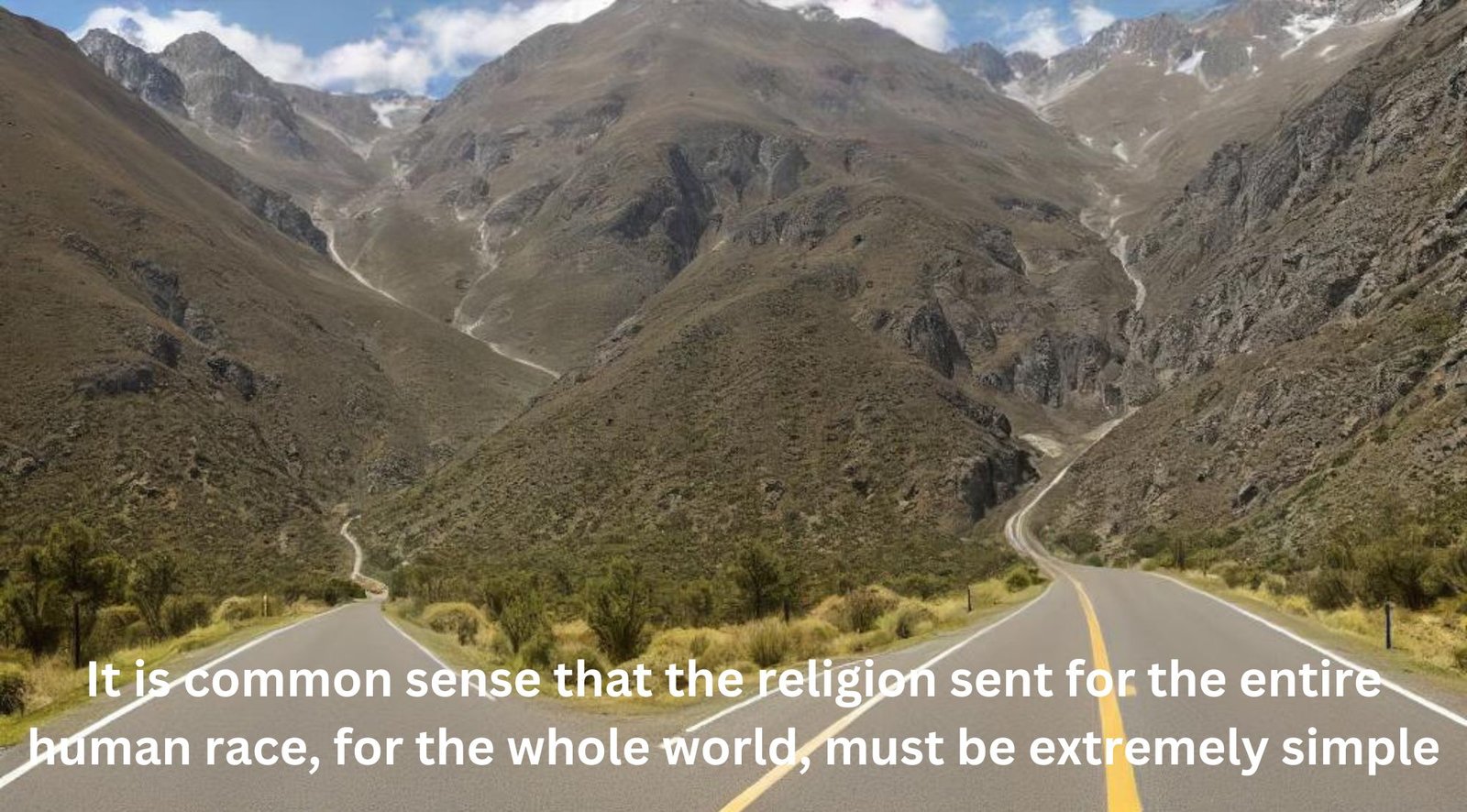 age, color, whether it was trained for plowing or watering, or if it had any defects (Quran - Surah Al-Baqarah 2:67-71). However, the Israelites began to question excessively, trying to push Allah for answers to various details about the cow. They kept insisting for more specifics until it became extremely difficult to find a suitable cow. This is a clear example of how a simple command—"sacrifice a cow"—was needlessly complicated to the point where finding a suitable cow became nearly impossible. Similarly, the Messenger Muhammad (peace be upon him) began this monumental task of reform with just two simple directives: "No one shall be obeyed over me," and "No other laws shall be followed besides the ones I have given," and "This way of life shall be established throughout the world." Two straightforward commands. But, like the Messenger's predecessors, the religious leaders of his community pushed the boundaries and destroyed their religion. Despite the stern warnings of Allah and His Messenger (peace be upon him), the predecessors of the Messenger's community did not heed any of it. The clergy their entire lives, delving deeply into the intricacies of Quranic interpretation and hadith, constructing a vast edifice of fiqh jurisprudence. Their genius, talent, and dedication to scholarship, when reflected upon, inspire reverence. However, as a result of their efforts, the community became fragmented, divided, and eventually perished. They were defeated by their enemies.
age, color, whether it was trained for plowing or watering, or if it had any defects (Quran - Surah Al-Baqarah 2:67-71). However, the Israelites began to question excessively, trying to push Allah for answers to various details about the cow. They kept insisting for more specifics until it became extremely difficult to find a suitable cow. This is a clear example of how a simple command—"sacrifice a cow"—was needlessly complicated to the point where finding a suitable cow became nearly impossible. Similarly, the Messenger Muhammad (peace be upon him) began this monumental task of reform with just two simple directives: "No one shall be obeyed over me," and "No other laws shall be followed besides the ones I have given," and "This way of life shall be established throughout the world." Two straightforward commands. But, like the Messenger's predecessors, the religious leaders of his community pushed the boundaries and destroyed their religion. Despite the stern warnings of Allah and His Messenger (peace be upon him), the predecessors of the Messenger's community did not heed any of it. The clergy their entire lives, delving deeply into the intricacies of Quranic interpretation and hadith, constructing a vast edifice of fiqh jurisprudence. Their genius, talent, and dedication to scholarship, when reflected upon, inspire reverence. However, as a result of their efforts, the community became fragmented, divided, and eventually perished. They were defeated by their enemies.
Let there be an end to excess, and may understanding rise
If you look at a huge house through magnifying glass, you'll see the wall as a giant mountain, the tiniest crack on the wall will appear much larger, even the grains of sand in the walls will seem much bigger, as a result, you won't be able to understand the natural beauty of the house, the facilities, and opportunities it offers. You'll actually misunderstand it. These so-called Alem, forever engrossed as they are in dissecting the minute details within this great way of life are missing the greater picture of the simplicity and beauty of Islam, due to their over analysing and blind following. They don't consider it natural to establish the teachings of Islam in national life. They have deviated into confusion by adopting Western capitalist economy, social system, state system, etc. Today, the people who consider themselves as the ummah of Muhammad, they worship two gods, two creators, two gods. They worship one creator, Allah, by performing abundant prayers, fasting, Hajj, Zakat, wearing beard-cap, circumcision, reciting prayers, Tahajjud, keeping long beards, unnecessarily screaming and shouting, restricting the movement of girls and women , and practice political and economic systems according to other gods. There can be no bigger ‘Sherk’ than this, nor a bigger betrayal of trust. The lordship, the sovereignty of Allah is necessary in national life, not only in personal life. Adultery and theft are personal sins; whoever succumbs to Satan's temptation commits those sins. But denying the lordship of Allah in national life, rejecting the national system of life given by Him, accepting the system created by others, results in disaster. Allah's sovereignty is infinite, His mercy is infinite, that's why forgiveness is sought from Him after committing injustice, sin (Quran An-Nisa 4:48). But rejecting His sovereignty, rejecting the national life system given by Him, and adopting any created by others, the superficially successful system, will not be forgiven, He has promised not to forgive that. It is a sin that is knowingly committed , it is not one that a person commits against the better judgement of the self or when one is instigated by the devil within either. It is a result of being influenced enough by one’s education and understanding to willingly disregard all of Allah’s national directives and replace those with man made ones. This is ‘Sherk’, ‘Kufar’ . The actions of the upholders of this faith, those who claim to be following the rituals of the faith right, reminds one of a particular incident of long ago. Before leaving for Hajj, an Iraqi asked for a fatwa from Khalifa Omar's (RA) son Abdullah on what to do if he killed a fly during Hajj. Abdullah ibn Omar (RA) said, "How strange! The Iraqis who killed the grandson of Allah's Messenger (SAW), Hussain (RA), are now asking for a kaffarah fatwa for killing a fly." Due to distorted beliefs, today's situation of the Muslim world is just like that Iraqi.
Images Related to this Post











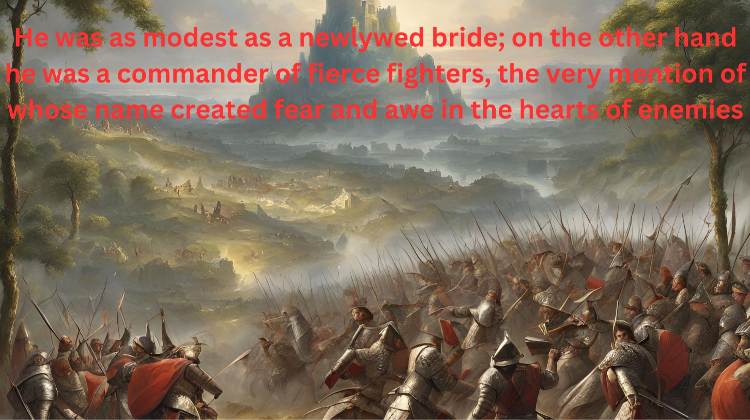



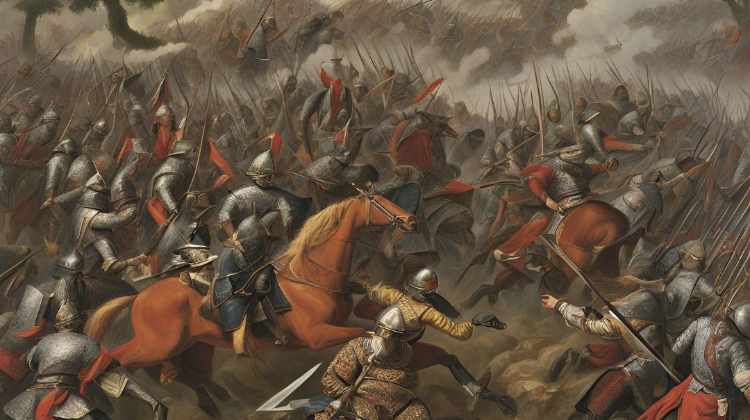
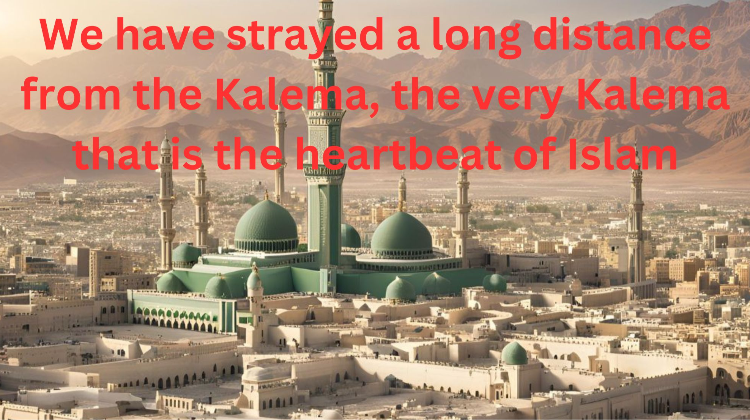
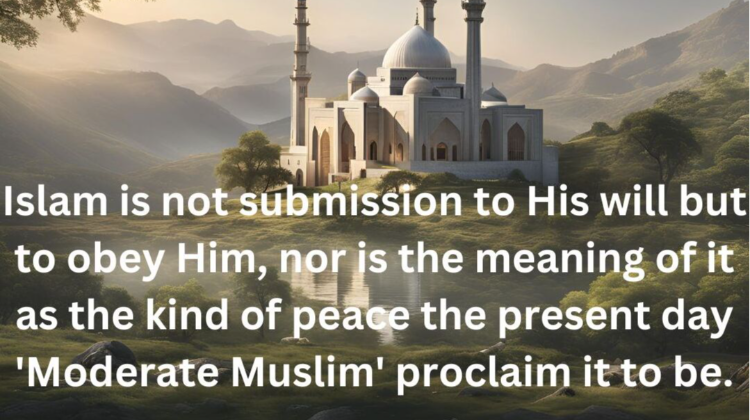

Leave a Comment